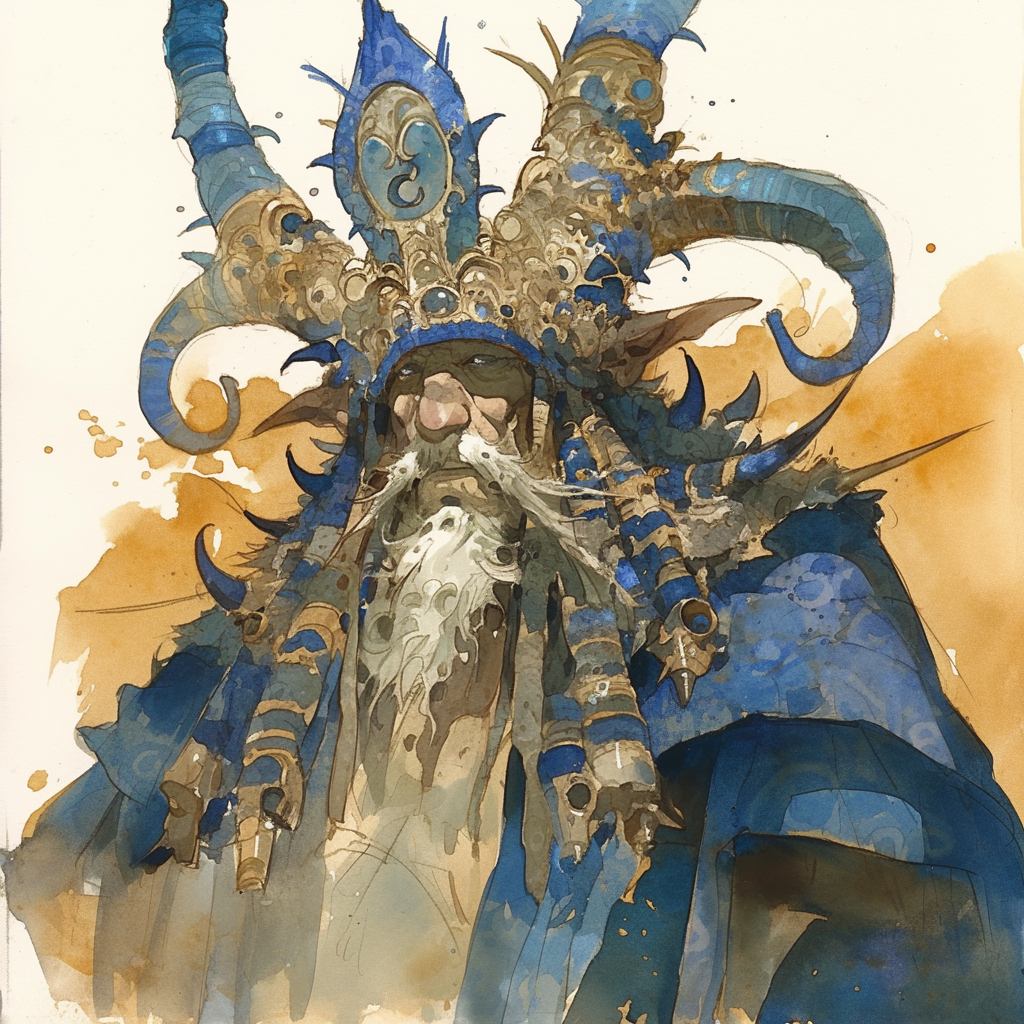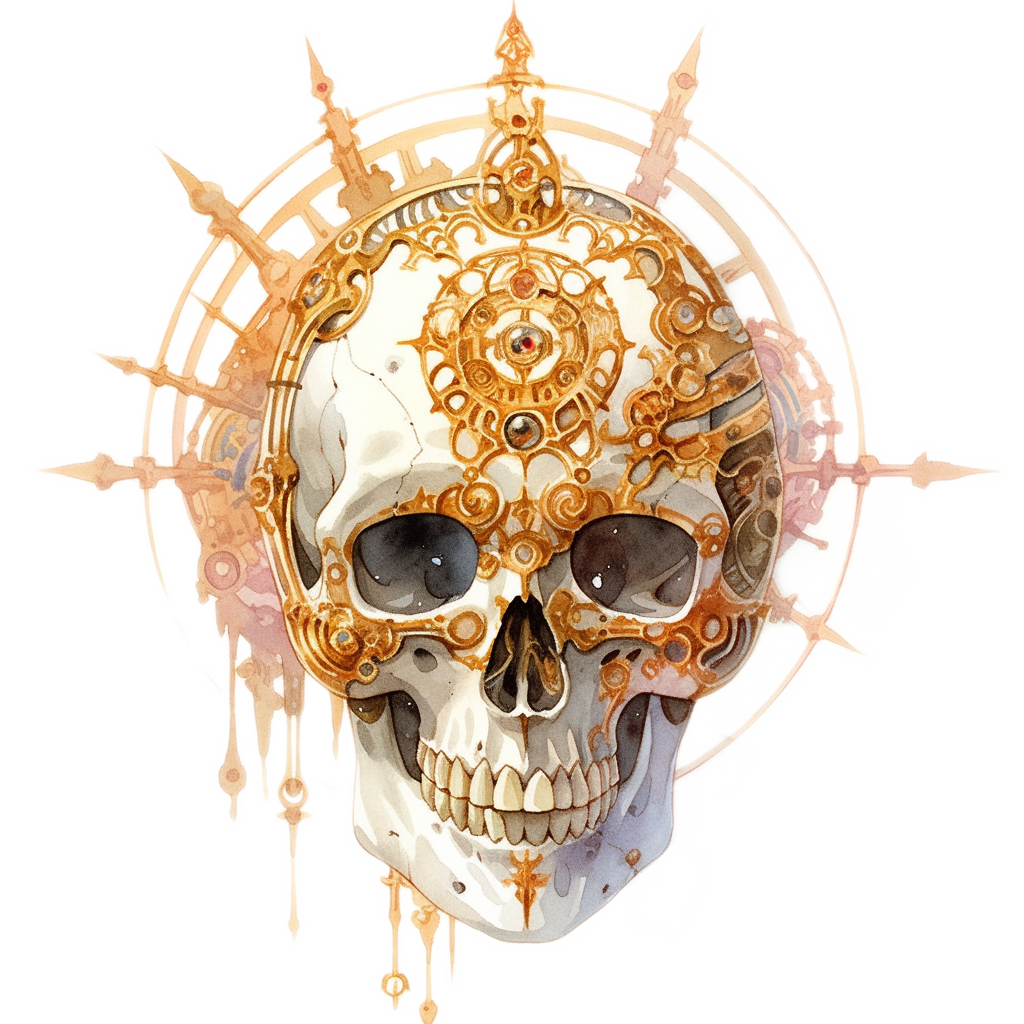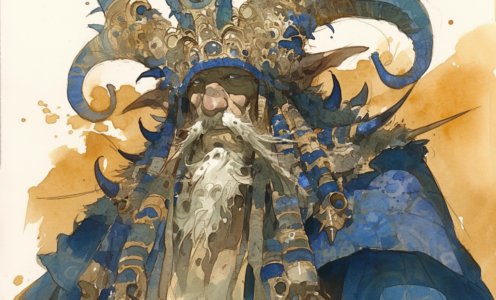Anu

An, El, the Sky Sovereign. LN greater power of creation, the sky, law. Leader of the Babylonian Pantheon [He/Him]
Pantheon: Babylonian (Leader); Sumerian (as An); Mespotamian
Symbol: A horned crown
For the Babylonians, Anu is the top of the heap, the supreme power of the sky, and the king of the pantheon. He’s one of the most ancient powers in any pantheon, with his roots stretching back to the very dawn of human civilisation. He’s the power credited with setting out the rules for how an empire should work, and his strict views on social hierarchy and the importance of watchful law have shaped both his priesthood and his realm in Mechanus.
Appearance
Anu is most commonly depicted as an old bearded man, sat on a grand throne in his sky palace. As is the fashion in Mesopotamia, his heard is long and carefully fashioned, and his attire is made from melam, a divine substance that covers him in terrifying splendor. The symbol of Anu is the horned crown, an enormous and ornate artifact which he wears as a mark of his supremacy. Other Mesopotamian powers might wear horned crown as well cutter, but Anu’s is the grandest. His domain is the endless expanse of the sky—both the bright blue day and the star-studded night. The chant goes he’s able to see anything that happens under skies where the Babylonian pantheon is venerated.
Justice without mercy
—Creed of Anu
Personality
Anu’s personality? Well, think of him as a bit distant, aloof even. In a way he’s a bit like the sky he rules—always there, often clear and unchanging, but capable of a storm or a star shower when the cosmic order calls for it. He’s never one to muck about with the mortals; that was more the domain of other powers in the pantheon who preferred to meddle. Anu was always more concerned with the cosmic order, keeping the knife-edge balance of power among the gods, and making sure everyone knew their place—especially the younger, more rebellious deities. Unless you cross him, Anu isn’t particularly wrathful or loving; he behaves more like the ancient primordial forces themselves: impartial, immense, and often incomprehensible to those down below. He’s type to set things in motion, and then let others handle any mess that follows.
Philosophy
Anu’s philosophy is one of order, stability, and unyielding authority. He’s the embodiment of the sky—vast, remote, and indifferent to the petty squabbles of mortals and lesser powers. He believes in maintaining the balance of the multiverse, a cosmic order where every deity knows their place and every star moves in its proper course. As much as anyone knows about the mysterious aeons, it’s thought Anu has dealings with them, and perhaps is even a patron of sorts.
Anu’s justice is the backbone of his realm, and it is as severe as it is absolute. Chant has it that Anu created the heavens and the earth, and it is his strict guidance that keeps the other powers of the Babylonian pantheon in check. But this guidance is a double-edged sword, for while it ensures order, it also drives a wedge between the gods and their mortal followers. Some whisper that the lesser powers of the pantheon are growing restless, that they might one day pool their strength to challenge Anu’s dominance. For now, though, they remain in check, their power eclipsed by Anu’s unyielding authority.
To serve Anu is to walk a narrow path, for even the smallest infractions are met with harsh sentences. The petitioners of Anu’s Way, who strive to avoid breaking his laws, reflect this severity. Anu espouses consistency and uniformity above all else; his petitioners, for example, all share the same androgynous look, dress in the same azure blue kilts, and even have the same skin tone, eyes and hair. These petitioners are eerily similar, each possessing the same memories and knowledge, and they act with a precision and purpose that rivals the modrons themselves.
Allies and Enemies
His relationships within the pantheon are more about maintaining cosmic balance than familial affection. Anu supports and empowers those who uphold order, but he’s also quick to distance himself from those who sow chaos. He’s on good terms with Marduk, the champion who vanquished Tiamat, seeing in him the reflection of the necessary force to maintain cosmic harmony. But with Ishtar, his daughter who’s as passionate as she is unpredictable, his relationship is more complex—Anu is tolerant of her ambitions but wary of her impulsive nature.
Across the multiverse, Anu’s influence can be felt in subtle ways, and if you were to map out his alliances and rivalries with other pantheons, you’d see a delicate web of respect and caution. Back in the day he found a kindred spirit in the primordial Ouranos of the Greek pantheon, another sky god who knew the weight of the cosmos on his shoulders, though since Ouranous was overthrown by his son Cronus he hasn’t been seen, by mortal eyes at least.
In contrast, Anu is often at odds with chaotic gods like Loki of the Norse, whose very existence seems to mock the order Anu holds dear. There’s no place for tricksters in Anu’s vision of the cosmos, and while he wouldn’t bother engaging in direct conflict, he’d certainly steer his allies against such forces of disruption. Judgemental old Anu isn’t even a fan of Zeus, although a fellow sky power, Anu sees Zeus as something of a young upstart and too unstable and chaotic to be an effective ruler.
On his home turf of Mechnus, Anu shares a respectful distance with entities like Primus, the modron leader. They’re said to understand each other’s purpose, though Anu does sometimes find Primus a bit too mechanical, lacking the nuance of cosmic wisdom.
Myths Involving Anu
In Mesopotamian mythology, Anu’s role often involves him as a figure of authority and cosmic order rather than a central actor. One of the more notable tales involves the Epic of Gilgamesh, a mortal hero of legendary status. Anu appears here as the head of the pantheon, and it’s his might that’s called upon when the gods decide to deal with Gilgamesh’s arrogance and Enkidu’s challenge to the divine order. It’s Anu who grants the Bull of Heaven to his daughter, Ishtar, after she’s spurned by Gilgamesh. The Bull of Heaven is sent to punish Gilgamesh, but as the story goes, it doesn’t end well for the beast.
In another myth, the tale of Anzu, a monstrous bird-demon steals the Tablet of Destinies from Enlil, the Sumerian god of wind, storms, and royal power. In this myth, as the upholder of cosmic law and order, Anu issues the command to retrieve the tablet to other powers. As befits a reclusive power, Anu didn’t directly get his hands dirty, but ensured that things were set back right when the natural order was disturbed.
Canonical Sources
- Dragon Magazine #16 p4,6; #329 p36-37
- Dungeon Magazine #148 p66
- On Hallowed Ground [2e] p63-65,172 (main entry)
- Planescape Campaign Setting [2e] DM’s Guide p61
Source: Jon Winter-Holt.


